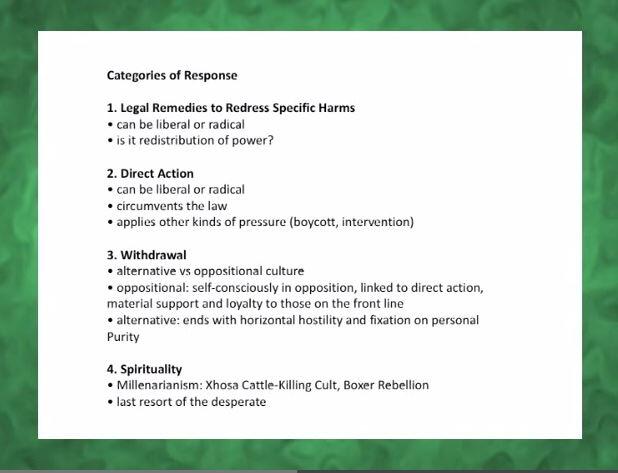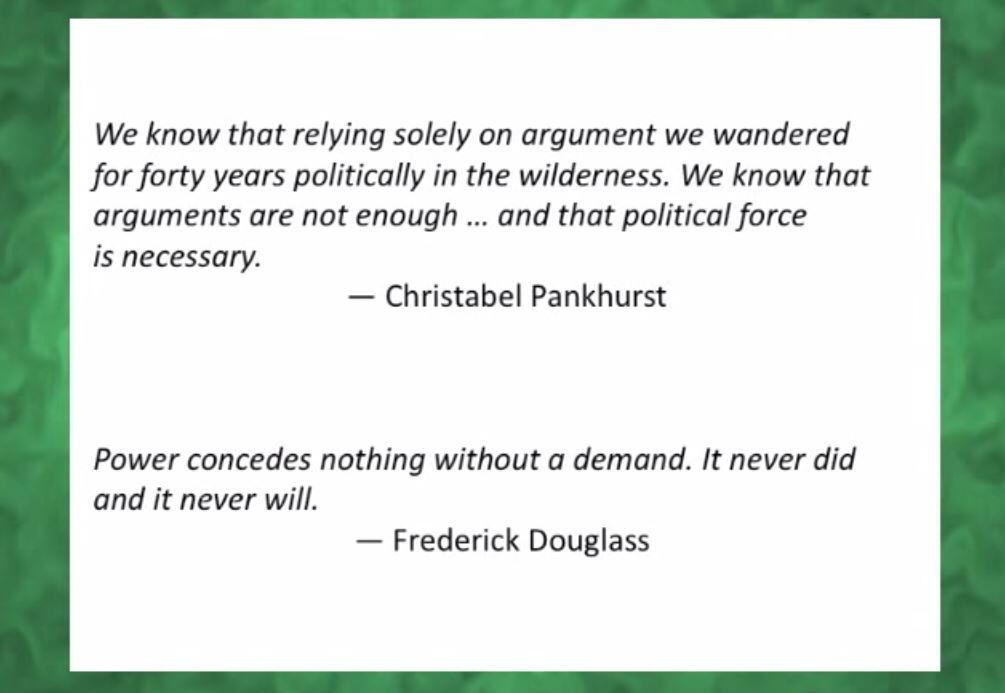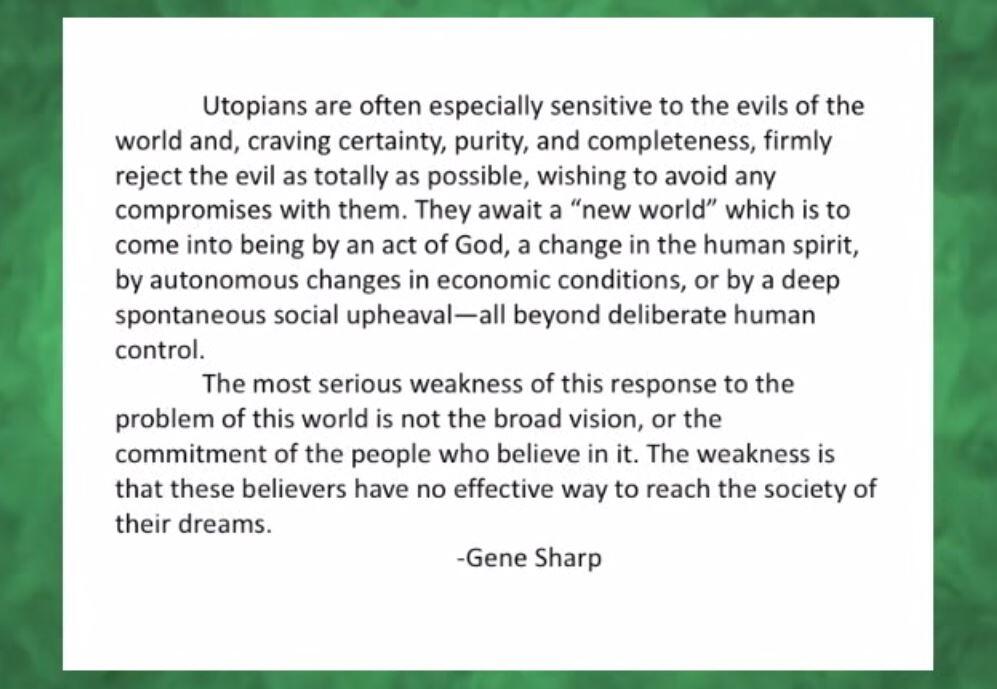Don’t miss Liberal vs Radical part one and part two.
[youtube
&w=640&h=390](Video captions available in English, Russian, Portuguese. Contact us if you would like to translate this or other Deep Green Resistance videos to another language.)
Video Transcript:
Once people realize that bad things are happening most of us are called to action. I would say these are the four main categories of response.
The take home point here, if you remember nothing else from this, is that all four of these categories can be either liberal or radical.
None of them are inherently liberal or radical. It depends how we use them. They all have strategic strengths, they all have strategic failings. So it depends what we want to do with them.
This is the realization to which radicalism brings you. My two favorite people again.
Social change requires force. Why? Because it’s not a mistake out of which the powerful can be educated. Don’t misunderstand me that when I say “force”, that does not have to equal violence. Whether or not to wage your struggle using violence or nonviolence is a decision that comes way later, way down the pike.
Nonviolence is a very elegant political technique if it is understood and used properly. I don’t think that it is being used properly on the left right now but this is not a division between violence and nonviolence. It is only to recognize that power is not a mistake, I mean, not unless you’re a liberal.
Again, if you want to be a liberal, great, if that’s the framework that works for you, it’s your decision. I mean really, some of my best friends, right?
[Lierre Keith and audience laugh]
Back to our categories.
The first one is legal, for obvious reasons. A lot of activist groups really focus on making legal changes to the social power. And, to quote Catharine MacKinnon, “Law organizes power”, so it makes sense that a lot of us will sort of gravitate to that. The trick is we got to do that as radicals and not as liberals.
Basic question: Does this initiative, whatever it is, does it redefine power? Not just who’s at the top of the pyramid, but does it actually redefine power? Does it take power away from the powerful and redistribute it such that we all have some control over the material conditions? That would make it a radical action. But a lot of people, they give up on the legal stuff, or it doesn’t appeal for whatever reason.
Direct action, also tried and true. You can totally bypass the legislative arena and get a lot done. Usually that’s some kind of civil disobedience. It can be letter writing, petitioning, some kind of pressure but it really kicks into gear when you hit them economically.
Great example is the Montgomery Bus Boycott. It was not a legal campaign, it was “we’re going to hit them economically”, and they did. They brought the bus company to their knees and made them stop segregating the buses. So it can be very effective.
Your basic insurrection would be another good example of direct action. That covers a lot of ground from very liberal things to very successful movements on up to really profound change.
Number three is withdrawal. Now this is a tricky one. The main difference between withdrawal as a successful strategy and withdrawal as a failed strategy is whether that withdrawal is seen as adequate in itself or whether it’s seen as necessary, connected to a larger political struggle. And that distinction hinges exactly on the difference between liberal and radical. Because issues of identification and loyalty are crucial to resistance movements but they’re not enough because your emotional state is not actually what’s going to create political change.
The withdrawal has to go beyond the intellectual, beyond the emotional, beyond the psychological. It’s got to include a goal, actually winning justice by withdrawing.
Withdrawal may give solace but ultimately it will change nothing. Living in a rarefied bubble-world of the already converted is a very poor substitute for freedom and it will not save our planet.
This is Gene Sharp, who I think is marvelous, and you should go to the library, get every book he’s ever written, keep you busy for a year. He makes a very similar point. The people who he calls “utopians” I would call “withdrawalists”.
They’re often especially sensitive to the evils of the world, they crave certainty and purity, they reject the evil as firmly as possible, they don’t want to have any compromise, and they await this new world, which will come into being by either an act of God, a change in human spirit, autonomous changes in conditions, some kind of spontaneous upheaval… but all of these are beyond deliberate human control.
The most serious weakness of this response to the problem of this world is not the broad vision or the commitment of the people who believe in it. The weakness is that these believers have no effective way to reach the society of their dreams. That about sums up my youth.
[L.K. and audience laugh]
I’ve heard the phrase “secular millennialism” and that’s exactly what he’s getting at.
So the left has these vague notions that our actions will inspire others, that even more vaguely these will accumulate into some kind of meaningful social change, or kick off a spontaneous insurrection.
There’s a nonviolent version which is usually lifestyle stuff like diet. There’s the more militant actions like the Weather Underground. Those are the two poles of secular millenialism. Change will happen because it MUST or because the Great Turning narrative says it will, or because the fires of our righteous rage will make it be so.
Given that revolution is not actually inevitable, I think we would be wise to understand the basic principle of resistance. “Dislodging injustice requires”, in the words of Andrea Dworkin, “organized political resistance”.
This brings us to the next category which is spirituality.
Withdrawalists’ stance is usually based on despair but it’s an answer that relies on faith, not on strategy. Which is to say, it’s an emotional response, an emotional solution, and it’s not a material solution. This merges right into Millenarianism.
Millenarianism is any religious movement that predicts the collapse of the world order as we know it, to be replaced by this wonderful time of justice and whatnot. There are lots of examples across history of desperate people taking this up. I highly recommend reading up on this.
Much of the left has been infected by this kind of thinking. We’re going to meditate to stop global warming, we’re going to orgasm our way to peace…
If all else fails, which it will, December 2012 is coming up, right? How many of these have we lived through? I’m 46, I think I’ve lived through 4? Every 10 years there’s another one, right? It’s not going to happen.
The worst examples in history that we know of: the Xhosa Cattle Killing Cult. The Xhosa are cattle-herding people in eastern South Africa. In the 1700s there’s various colonial invasions, displacement, genocide, war, all these horrors. By 1854 there’s this terrible lung disease and a whole bunch of the cattle die so the people are just incredibly vulnerable at this point, and somebody has a vision.
A teenage girl has a vision, and the vision is, if we kill all the cattle, destroy all our food stocks, even our cooking pots, everything, then this great thing will happen. The dead are going to return, the food supplies will just spring up overnight, there’s going to be gigantic cattle that you’ve never even seen before, they’re so big, and the spirit warriors will drive the British out and we will have our land again.
This vision starts to spread, everybody starts having visions, it’s just like this mass visioning is happening everywhere.
People believe it, more people believe it, they start killing the cattle. At some point so many cattle are killed that the carrion birds can’t even keep up with it. There’s so many corpses rotting in the sun. 400,000 beasts are slaughtered by the end of this.
The first deadline comes, does anything happen? One guess… no.
And of course the unbelievers are blamed. This is always where it ends with this kind of millenialism. It’s YOUR fault ‘cause you didn’t believe it. So the very last cattle have to be killed.
A few people are hanging on, “nah, I’m just going to keep this one cow for some milk”. You can’t do it. So every last cattle has to be killed.
So, what happens? Mass starvation ensues. All its attendant atrocities and horrors, people ate corpses, people ate grass, people ate their children. I mean it’s just absolute hell. The population at one point was 105,000 and it collapses to 26,000 people, a lot whom had to escape into cities ‘cause they were just starving in the countryside.
150 years of imperialism could not defeat the Xhosa but 2 years of millennial fever almost did.
So, bad example.
The Boxer Rebellion is another one, just as horrible. They called themselves the Righteous Harmony Society. This was a religious society in northern China that was absolutely a response to the Opium Wars and British Imperialism. You get why people are desperate.
They did martial arts, diet and prayer and they believed they’d be given the power to fly if they did this. And absolutely, they had special garments, protection against bullets and swords. You find that theme a lot. You’re going to wear this special garment and they won’t be able to kill you.
There was going to be an army of spirit soldiers that was going to arrive to save the day and drive out the British. They never appeared. The entire thing ends in complete disaster for China. Very evil stuff. How the British responded was just appalling.
Anyway, two examples and it is really worth, I think, knowing more about this because I just see these tendencies all the time and it’s not going to end well for us either.
Divine intervention has never yet stopped a system of unjust power across the entire sweep of human history. As a political strategy it is a complete failure and we really need to get over this one.
This is not in any way to dismiss the role of spirituality in a resistance movement. Spirituality is so often the core of any culture, and it is often the cradle of the resistance movement.
A lot of people talk about the black churches as the beginning of the Civil Right Movement, the Anti-Apartheid Movement also, the churches play this huge role. All across the world you can find how the Tibetans and the Buddhism, how this all comes together. It gives people incredible dignity and strength, you can get yourself respect through your spiritual practice. It absolutely helps communities stay together under really brutal conditions, helps set community norms.
All that is incredibly important. My point, really, is that faith is not a political strategy.
The only miracle we’re going to get is us.
Don’t miss Liberal vs Radical part two.
Watch more DGR videos: http://youtube.com/user/DeepGreenResistance.


